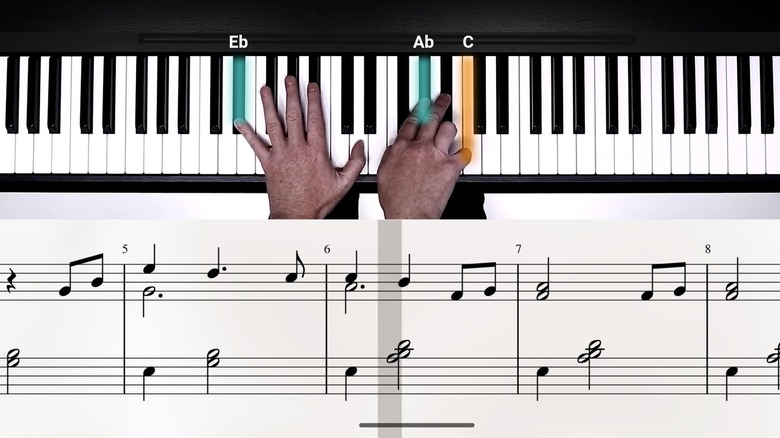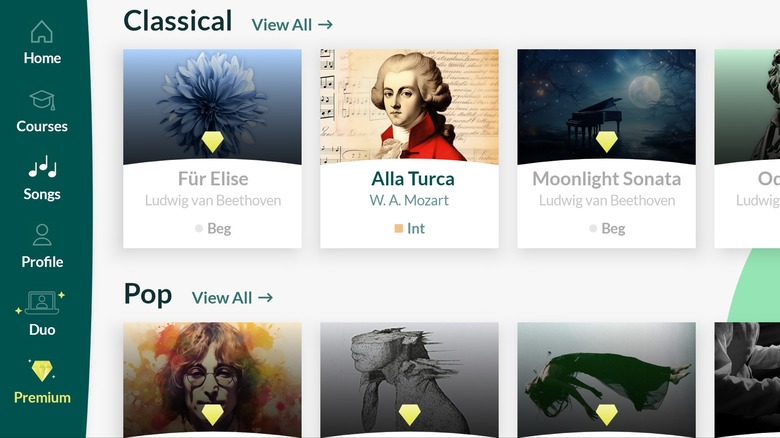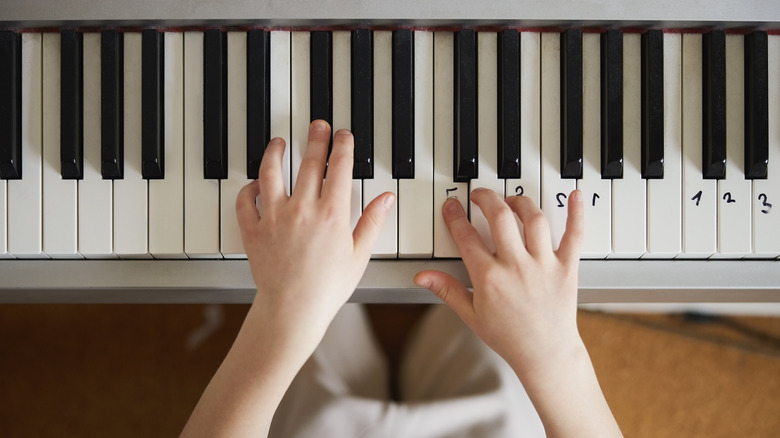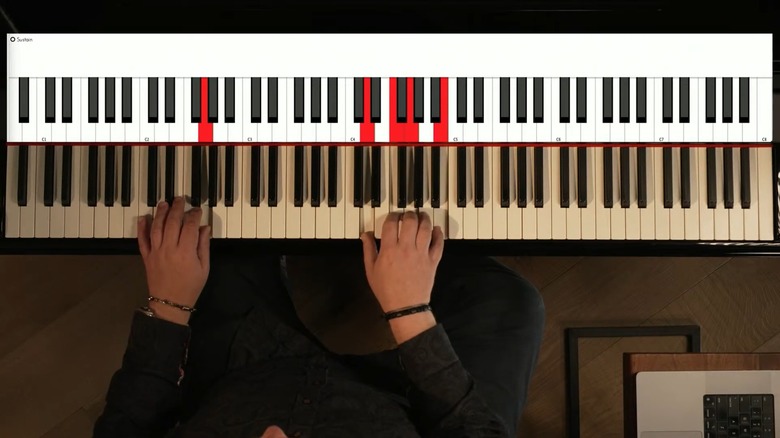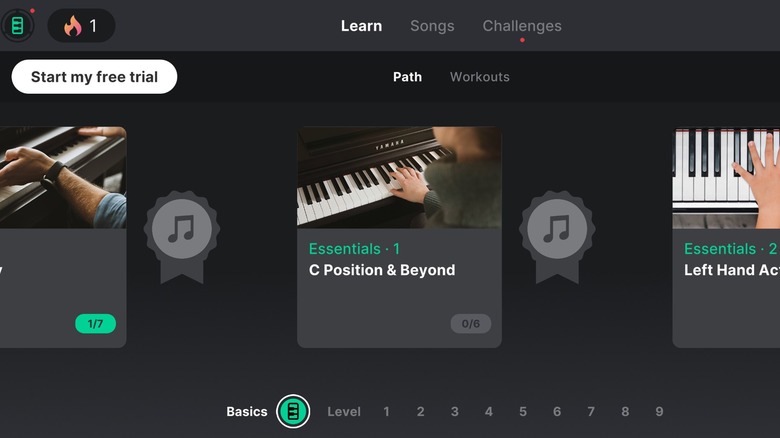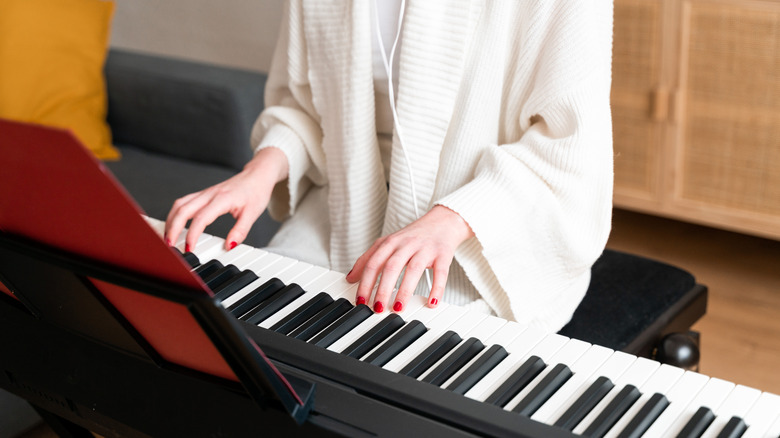5 Of The Best Apps For Learning Piano
If you're looking for a hassle-free, more affordable way to start learning piano than in-person lessons, there are several iPhone apps that can teach you an instrument, not to mention must-have Android apps for musicians. Apps that teach you piano involve an easy setup, typically placing your phone or tablet on your piano stand. Some apps even feature a virtual keyboard if you don't yet own a keyboard or piano. We'll be exploring the best apps for learning piano based on hands-on experience, so you can easily level up your piano playing skills at home.
The top piano learning apps are surprisingly intuitive and accessible, with many of them offering features that simulate in-person lessons. For instance, some apps allow you to select a passage of music to practice on repeat. Others let you adjust the playback tempo, so you can familiarize yourself with the melody. But perhaps the most impressive among all the features is the ability to listen through your phone's microphone and provide instant feedback.
Given the advanced capabilities of piano learning apps, be expected to pay a price. The vast majority of apps offer access to a limited library of songs and lessons for free, but you'll need a paid subscription if you want the best learning experience. Let's look at some of the best apps for learning piano.
Flowkey
Flowkey is a great piano app for beginners offering a large variety of ways to learn. In the app, you can take courses to learn the basics of piano playing, and you can practice scales and arpeggios too. It's not all about music theory though — you can learn piano through your favorite songs spanning across a wide range of genres, including classical, romantic, pop, and jazz.
The learning experience in Flowkey is both beginner-friendly and accessible. The top half of the interface features a live recording of the piano, while the bottom half displays the sheet music. To pause, simply tap the screen. You can also choose which measure to start from by swiping right or left. One nice touch is the loop function, which allows you to select a passage of music on repeat.
When picking a song, you can choose a difficulty setting based on your skill range, though some require a subscription. By default, the song will play at the original tempo. However, you can also learn at 50% or 75% speed, or use the smart function called Wait Mode which listens to your playing and moves on accordingly. You can access a limited range of songs for free, basic access to classical and royalty-free music for $19.99 per month, and up to $29.99 per month for access to the app's full library of songs.
Skoove
Skoove adopts a smart learning approach to playing the piano, breaking down each lesson into steps that simulate having a teacher. At first, you'll hear a song before learning it with each hand separately. Once that's nailed down, you can play it in tempo. In addition to the vast range of songs, there are dozens of lessons on playing technique too.
Skoove offers a personalized piano playing experience from the get-go, prompting you to choose your level of experience during setup. You can also choose whether you want to focus on music theory or just learn some songs. Skoove follows a similar pricing structure to Flowkey, with limited access to some songs before you need to pay a subscription to unlock them all. Like Flowkey, you can get a premium subscription for $29.99 per month.
Learning controls are both intuitive and suitable for small devices. To enable hands-free operation, the app offers a mode that listens to your playing and provides instant feedback. If you prefer not to view scrolling staves, you can opt to view the full score at the end of each lesson.
Piano Academy
If you're looking for more of a fun hobby feel for your kids, consider Piano Academy. The child-friendly app is eye-catching for younger children and is packed with rewarding features. During the setup, you can add multiple profiles, such as one for parents and another for your child.
Much like its competition, the app listens through your microphone to detect notes. In the lessons for beginners, you'll learn the correct finger positioning for notes, see where notes lie on the staff, and play along to popular tunes from "The Lion King" and "SpongeBob SquarePants." Learning songs gets super fun with the backing tracks playing throughout, and the app gives you achievement stars for completing songs.
Playback controls are relatively limited compared to Skoove and Flowkey, so it's sensible to say the app is geared towards fun and enjoyment rather than serious learning. That said, if you're eager to get your kids off the couch, Piano Academy offers a fun learning experience. The app offers basic lessons for free, and then charges $19.99 per month for access to more songs and features.
Musora (Pianote)
Pianote used to be its own app, but now it's joined forces with apps like Guitareo, an app for learning guitar. Now they're called Musora — a music learning app featuring a host of lessons from industry experts. The app features scales and chords, playing techniques, and advanced music theory. But it doesn't offer a structured learning plan like other apps, so Musora may be best suited for those who already know a bit about piano and want to progress their skills.
The interface is clunkier than others, but there are similar features. You can hit the loop button to practice an individual passage of music, and you can switch a metronome on and off.
Where Musora really shines is in its coaching videos. Some are structured in mini video series, while others are one-off videos on a specific topic. They aren't organized into a learning plan, but you're guaranteed a variety of high-quality videos from professionals if you start poking around.
Musora also has a dedicated forum where you can chat with other pianists of all abilities. It's a wholesome place where you can partake in challenges, set goals, show off your talents, or just chat with other musicians.
Overall, Musora is an app built for musicians looking to take their piano playing to the next level. A subscription of $25 per month is required to access Musora's lessons, and it costs an additional $5 per month for access to the song library as well.
Piano by Yousician
Piano by Yousician offers a unique piano-playing experience for musicians of all levels. The app's guided lessons allow you to start learning from scratch and are split into levels based on difficulty. Piano by Yousician adopts a gamified learning approach to help you stay motivated, including the ability to level-up, earn badges, and set records for your hourly practice.
The app hosts a large variety of songs to learn from an array of musical genres, such as blues, rock, country, and pop. If you're waiting to buy a keyboard and want to get a head start, Yousician features a built-in keyboard option, so you can play along on your phone or tablet. Another nice touch is the beginner-friendly notation formats which use colored blocks rather than notes if music theory feels too foreign.
As any musician knows, learning an instrument is no easy feat, but Piano by Yousician offers a welcoming environment to practice piano with fun, interactive lessons and a full library of songs to learn from. Each lesson offers a Practice and Play mode, and you can create Collections to save lessons if you need to refer back to them. To make sure you don't miss a lesson, you can also set notifications to receive reminders to practice. You can enjoy limited songs on the basic plan or upgrade to the Premium+ plan starting at $19.99 per month.
Methodology
To help you pick the best piano app for your skill set, we've tested these apps with hands-on experience from the author. As a musician with a degree in music, I have a firm understanding of music theory and a strong understanding of keyboard and piano playing. Each app listed is designed for different audiences, including younger learners and people seeking to learn from professionals, which is meant to offer various options depending on your learning style. What's common among the apps is they all allow you to learn using well-known songs, making your practice sessions more fun and relatable.

